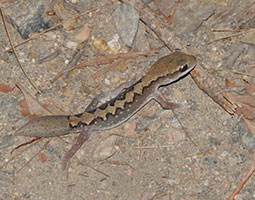Diplodactylus vittatus
Description

Also known as a Wood gecko this nocturnal lizard is quite small at 9cm long and has a stout body. Eastern Stone Geckos (Diplodactylus vittatus) have a grey or dark brown upper body with a pale zigzagging or straight line along the middle of the back from head to tail. They are much paler under the belly and have a short, fat tail. Like all geckos they have the ability to lose and regrow their tail if attacked. The tail that is regenerated will then lose its pattern beyond the point where it broke off. When threatened they will stand up high on four legs and open their mouths to scare away potential predators
The Eastern Stone Gecko reproduces from September to March, producing a maximum of two eggs. However, they can have multiple clutches during the breeding season. Like many geckoes, they can communicate through use of a call that can also be produced when threatened.
This species of gecko prefers dry open woodlands and shelter in small burrows beneath rocks, logs and dense leaf litter during the day.
Adaptations
- Toes are expanded and have special pads to enhance climbing
- Lose and regenerate their tail if attacked by predator (Can run twice as fast without it!)
- Camouflage skin to hide in leaf litter
- Store extra energy (i.e. fat) in their tails that they can then use in periods of brumation (i.e. reptile hibernation)
- Clean their eyes with their tongues
Feeding relationships
- What I eat: Insects and other invertebrates
- What eats me: Kookaburra, Lace Monitor, Gold Crowned Snake, Tawny frogmouth, Burton's Snake Lizard, almost any carnivore
Interesting facts
Eastern Stone geckoes can sometimes be confused with another local gecko, the Robust Velvet gecko (Oedura robusta). However, they can be easily distinguished by their tail length i.e. eastern Stone geckoes have a tail half their body length while Robust Velvet geckoes have a tail that is almost as long as their body.